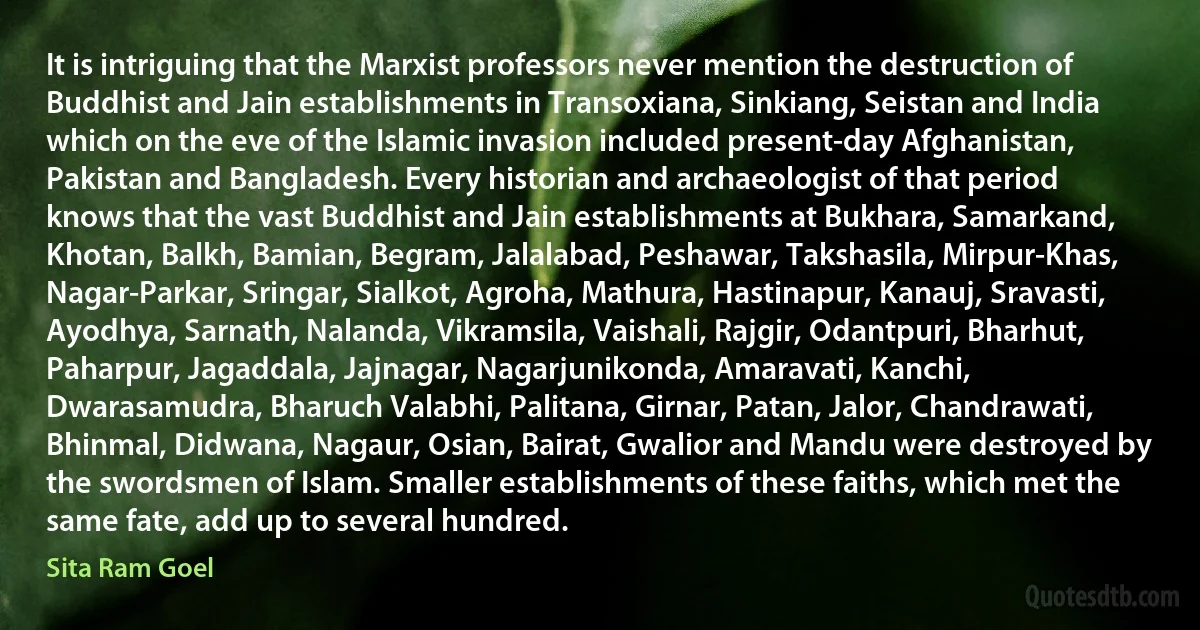
It is intriguing that the Marxist professors never mention the destruction of Buddhist and Jain establishments in Transoxiana, Sinkiang, Seistan and India which on the eve of the Islamic invasion included present-day Afghanistan, Pakistan and Bangladesh. Every historian and archaeologist of that period knows that the vast Buddhist and Jain establishments at Bukhara, Samarkand, Khotan, Balkh, Bamian, Begram, Jalalabad, Peshawar, Takshasila, Mirpur-Khas, Nagar-Parkar, Sringar, Sialkot, Agroha, Mathura, Hastinapur, Kanauj, Sravasti, Ayodhya, Sarnath, Nalanda, Vikramsila, Vaishali, Rajgir, Odantpuri, Bharhut, Paharpur, Jagaddala, Jajnagar, Nagarjunikonda, Amaravati, Kanchi, Dwarasamudra, Bharuch Valabhi, Palitana, Girnar, Patan, Jalor, Chandrawati, Bhinmal, Didwana, Nagaur, Osian, Bairat, Gwalior and Mandu were destroyed by the swordsmen of Islam. Smaller establishments of these faiths, which met the same fate, add up to several hundred.
Sita Ram GoelRelated topics
add archaeologist eve fate historian hundred intriguing islam met mention vast marxist afghanistan bangladesh islamicRelated quotes
Islam is one of the world's great religions. Let me be explicit about what I, as a historian of Islam who is not a Muslim, mean by that. Islam has brought comfort and peace of mind to countless millions of men and women. It has given dignity and meaning to drab and impoverished lives. It has taught people of different races to live in brotherhood and people of different creeds to live side by side in reasonable tolerance. It inspired a great civilization in which others besides Muslims lived creative and useful lives and which, by its achievement, enriched the whole world. But Islam, like other religions, has also known periods when it inspired in some of its followers a mood of hatred and violence. It is our misfortune that part, though by no means all or even most, of the Muslim world is now going through such a period, and that much, though again not all, of that hatred is directed against us.

Bernard Lewis
Throughout the whole range of Urdu literature in its first phase... the atmosphere of this literature is provokingly un-Indian - it is that of Persia. Early Urdu poets never so much as mention the great physical features of India - its Himalayas, its rivers like the Ganges, the Jamuna, the Sindhu, the Godavari, etc; but of course mountains and streams of Persia, and rivers of Central Asia are always there. Indian flowers, Indian plants are unknown; only Persian flowers and plants which the poet could see only in a garden. There was a deliberate shutting of the eye to everything Indian, to everything not mentioned or treated in Persian poetry... A language and literature which came to base itself upon an ideology which denied on the Indian soil the very existence of India and Indian culture, could not but be met with a challenge from some of the Indian adherents of their national culture; and that challenge was in the form of highly Sanskritized Hindi'.

Suniti Kumar Chatterji
If we regard Iran as a nation, there is no reason it shouldn't have correct relations with the United States or any other country. Decades of opinion polls show that a majority of Iranians have a good opinion of America. But Iran today suffers from a split personality: It is both a nation and, as the Islamic Republic, also a messianic cause. And the Islamic Republic of Iran, far from being part of the solution, is at the root of the conflict tearing the Middle East apart. It has built Shiite militias in Lebanon, Syria and Iraq, not to mention Afghanistan, with the aim of "exporting” its Khomeinist ideology. The mullahs' quest for an empire has provoked violent reaction from Sunni Arabs and enabled terrorist outfits such as al Qaeda in its many versions, including ISIS, to find a new audience and a narrative of victimhood. As long as Iran remains a "cause,” it can't normalize relations with anybody, let alone America. Coexistence among nations is not the same as that among causes.

Amir Taheri
What does peace mean in a world in which the combined wealth of the world's 587 billionaires exceeds the combined gross domestic product of the world's 135 poorest countries? Or when rich countries that pay farm subsidies of a billion dollars a day, try and force poor countries to drop their subsidies? What does peace mean to people in occupied Iraq, Palestine, Kashmir, Tibet and Chechnya? Or to the aboriginal people of Australia? Or the Ogoni of Nigeria? Or the Kurds in Turkey? Or the Dalits and Adivasis of India? What does peace mean to non-Muslims in Islamic countries, or to women in Iran, Saudi Arabia and Afghanistan? What does it mean to the millions who are being uprooted from their lands by dams and development projects? What does peace mean to the poor who are being actively robbed of their resources and for whom everyday life is a grim battle for water, shelter, survival and, above all, some semblance of dignity? For them, peace is war.

Arundhati Roy
It is scarcely possible to calculate the benefits which we might derive from the diffusion of European civilisation among the vast population of the East. It would be, on the most selfish view of the case, far better for us that the people of India were well governed and independent of us, than ill governed and subject to us; that they were ruled by their own kings, but wearing our broadcloth, and working with our cutlery, than that they were performing their salams to English collectors and English magistrates, but were too ignorant to value, or too poor to buy, English manufactures. To trade with civilised men is infinitely more profitable than to govern savages. That would, indeed, be a doting wisdom, which, in order that India might remain a dependency, would make it an useless and costly dependency, which would keep a hundred millions of men from being our customers in order that they might continue to be our slaves.

Thomas Babington Macaulay
